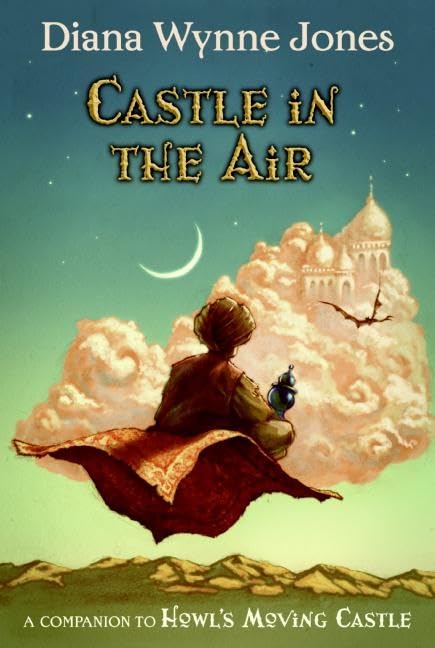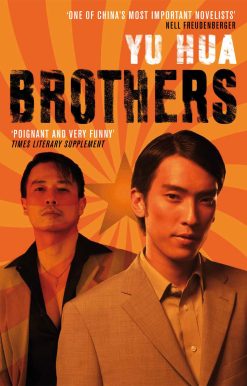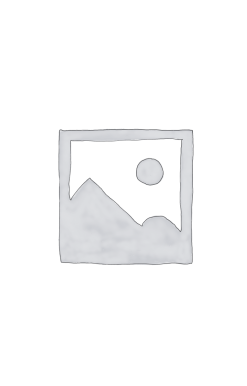Description
In this stunning sequel to Howl’s Moving Castle, Diana Wynne Jones has again created a large-scale, fast-paced fantasy in which people and things are never quite what they seem.
There are good and bad djinns, a genie in a bottle, wizards, witches, cats and dogs (but are they cats and dogs?), and a mysterious floating castle filled with kidnapped princesses, as well as two puzzling prophecies. The story speeds along with tantalizing twists and turns until the prophecies are fulfilled, true identities are revealed, and all is resolved in a totally satisfying, breathtaking, surprise-filled ending.
Abdullah was a young and not very prosperous carpet dealer. His father, who had been disappointed in him, had left him only enough money to open a modest booth in the Bazaar. When he was not selling carpets, Abdullah spent his time daydreaming. In his dreams he was not the son of his father but the long-lost son of a prince. There was also a princess who had been betrothed to him at birth. He was content with his life and his daydreams until, one day, a stranger sold him a magic carpet.
All fans of classic fantasy books deserve the pleasure of reading those by Diana Wynne Jones, whose acclaim included the World Fantasy Award for Life Achievement.
The three books in the World of Howl are:
Howl’s Moving Castle
Castle in the Air
House of Many Ways
Other beloved series from Dianna Wynne Jones include the Chronicles of Chrestomanci and the Dalemark Quartet.
Additional information
| Weight | 0.26 kg |
|---|---|
| Dimensions | 2.26 × 12.95 × 19.43 cm |
| By | |
| format | |
| Language | |
| Pages | 400 |
| publisher | |
| Year Published | 22-4-2008 |
| Imprint | |
| For Ages | 8-12 |
| Publication City/Country | USA |
| ISBN 10 | 0061478776 |
| About The Author | In a career spanning four decades, award-winning author Diana Wynne Jones wrote more than forty books of fantasy for young readers. Characterized by magic, multiple universes, witches and wizards—and a charismatic nine-lived enchanter—her books were filled with unlimited imagination, dazzling plots, and an effervescent sense of humor that earned her legendary status in the world of fantasy. From the very beginning, Diana Wynne Jones’s books garnered literary accolades: her novel Dogsbody was a runner-up for the 1975 Carnegie Medal, and Charmed Life won the esteemed Guardian children’s fiction prize in 1977. Since then, in addition to being translated into more than twenty languages, her books have earned a wide array of honors—including two Boston Globe-Horn Book Award Honors—and appeared on countless best-of-the-year lists. Her work also found commercial success: in 1992 the BBC adapted her novel Archer’s Goon into a six-part miniseries, and her best-selling Howl’s Moving Castle was made into an animated film by Japanese director Hayao Miyazaki in 2004. The film was nominated for an Academy Award in 2006, and became one of the most financially successful Japanese films in history. The author herself has also been honored with many prestigious awards for the body of her work. She was given the British Fantasy Society’s Karl Edward Wagner Award in 1999 for having made a significant impact on fantasy, received a D.Lit from Bristol University in 2006, and won the Lifetime Achievement Award at the World Fantasy Convention in 2007. Born just outside London in 1934, Diana Wynne Jones had a childhood that was “very vivid and often very distressing”—one that became the fertile ground where her tremendous imagination took root. When the raids of World War II reached London in 1939, the five-year-old girl and her two younger sisters were torn from their suburban life and sent to Wales to live with their grandparents. This was to be the first of many migrations, one of which brought her family to Lane Head, a large manor in the author-populated Lake District and former residence of John Ruskin’s secretary, W.G. Collingwood. This time marked an important moment in Diana Wynne Jones’s life, where her writing ambitions were magnified by, in her own words, “early marginal contacts with the Great.” She confesses to having “offending Arthur Ransome by making a noise on the shore beside his houseboat,” erasing a stack of drawings by the late Ruskin himself in order to reuse the paper, and causing Beatrix Potter (who also lived nearby) to complain about her and her sister’s behavior. “It struck me,” Jones said, “that the Great were remarkably touchy and unpleasant, and I thought I would like to be the same, without the unpleasantness.” Prompted by her penny-pinching father’s refusal to buy the children any books, Diana Wynne Jones wrote her first novel at age twelve and entertained her sisters with readings of her stories. Those early stories—and much of her future work—were inspired by a limited but crucial foundation of classics: Malory’s Morte D’Arthur, The Arabian Nights, and Epics and Romances of the Middle Ages. Fantasy was Jones’s passion from the start, despite receiving little support from her often neglectful parents. This passion was fueled further during her tenure at St. Anne’s College in Oxford, where lectures by J. R. R. Tolkien and C. S. Lewis increased her fascination with myth and legend. She married Medievalist John Burrow in 1956; the couple have three sons and six grandchildren. After a decade of rejections, Diana Wynne Jones’s first novel, Changeover, was published in 1970. In 1973, she joined forces with her lifelong literary agent, Laura Cecil, and in the four decades to follow, Diana Wynne Jones wrote prodigiously, sometimes completing three titles in a single year. Along the way she gained a fiercely loyal following; many of her admirers became successful authors themselves, including Newbery Award winners Robin McKinley and Neil Gaiman, and Newbery Honor Book author Megan Whalen Turner. A conference dedicated solely to her work was held at the University of West England, Bristol, in 2009. Diana Wynne Jones continued to write during her battle with lung cancer, which ultimately took her life in March 2011. Her last book, Earwig and the Witch, will be published by Greenwillow Books in 2012. |
| Review Quote | From the Back Cover About the Author Excerpt. © Reprinted by permission. All rights reserved. Abdullah had never been told why his father was disappointed in him. A prophecy made at Abdullah's birth had something to do with it. But Abdullah had never bothered to find out more. Instead, from a very early age, he had simply made up daydreams about it. In his daydreams, he was really the long-lost son of a great prince, which meant, of course, that his father was not really his father. It was a complete castle in the air, and Abdullah knew it was, Everyone told him he inherited his father's looks. When he looked in a mirror, he saw a decidedly handsome young man, in a thin, hawk-faced way, and knew he looked very like the portrait of his father as a young man, always allowing for the fact that his father wore a flourishing mustache, whereas Abdullah was still scraping together the six hairs on his upper lip and hoping they would multiply soon. Unfortunately, as everyone also agreed, Abdullah had inherited his character from his mother-his father's second wife-who had been a dreamy and timorous woman and a great disappointment to everyone. This did not bother Abdullah particularly. The life of a carpet merchant holds few opportunities for, bravery, and he was, on the whole, content with it. The booth he had bought, though small, turned out to be rather well placed. It was not far from the West Quarter, where the rich people lived in their big houses surrounded by beautiful gardens. Better still, it was the first part of the Bazaar the carpet makers came to when they came into Zanzib from the desert to the north. Both the rich people and the carpet makers were usually seeking the bigger shops in the center of the Bazaar, but a surprisingly large number of them were ready to pause at the booth of a young carpet merchant when that young merchant rushed out into their paths and offered them bargains and discounts with most profuse politeness. In this way, Abdullah was quite often able to buy best-quality carpets before anyone else saw them, and sell them at a profit, too. In between buying and selling he could sit in his booth and continue with his daydream, which suited him very well. In fact, almost the only trouble in his life came from his father's first wife'srelations, who would keep visitinghim once a month in order to point out his failings. "But you're not saving any of your profits!" cried Abdullah's father's first wife's brother's son, Hakim (whom Abdullah detested), one fateful day, Abdullah explained that when he made a profit, his custom was to use that money to buy a better carpet. Thus, although all his money was bound up in his stock, it was getting to be better and better stock. He had enough to live on. And as he told his father's relatives, he had no need of more since he was not married. "Well, you should be married!" cried Abdullah's father's first wife's sister, Fatima (whom Abdullah detested even more than Hakim). "I've said it once, and I'll say it again — a young man like you should have at least two wives by now!" And not content with simply saying so, Fatima declared that this time she was going to look out for some wives for him-an offer which made Abdullah shake in his shoes. "And the more valuable your stock gets, the more likely you are to be robbed, or the more you'll lose if your booth catches fire. Have you thought of that?"nagged Abdullah's father's first wife's uncle's son, Assif (a man whom Abdullah hated more than the first two put together). He assured Assif that he always slept in the booth and was very careful of the lamps. At that all three of his father's first wife's relatives shook their heads, tut-tutted, and went away. This usually meant they would leave him in peace for another month. Abdullah sighed with relief and plunged straight back into his daydream. The daydream was enormously detailed by now. In it, Abdullah was the son of a mighty prince who lived so far to the east that his country was unknown in Zanzib. But Abdullah had been kidnapped at the age of two by a villainous bandit called Kabul Aqba. Kabul Aqba had a hooked nose like the beak of a vulture and wore a gold ring clipped into one of his nostrils. He carried a pistol with a silver-mounted stock with which he menaced Abdullah, and there was a bloodstone in his turban which seemed to give him more than human power. Abdullah was so frightened that he ran away into the desert, where he was found by the man he called his father now. The daydream took no account of the fact that Abduffah's father had never ventured into the desert in his life; indeed, he had often said that anyone who ventured beyond Zanzib must be mad. Nevertheless, Abdullah could |



